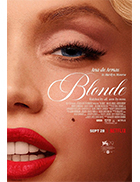Blonde
|  Blonde, Andrew Dominik’s much-debated adaptation of Joyce Carol Oates’s 700-page fictionalized novel about Marilyn Monroe, is a film that is so good and so bad in equal measure that it is hard to even begin to gauge it. Everything its detractors say about it is true: It objectifies its subject and contradicts its own supposed feminist take on her iconic status, wallows in sordid sensationalism by exploiting its status as “fiction,” and goes repeatedly off-track with flashy narrative and aesthetic gimmicks. At the same time, everything its defenders say about it is also true: It is gloriously daring in its deviance from the norms of the biopic, beautifully shot, at times touching and at times harrowing, and anchored by an amazing performance by Ana de Armas (Knives Out). Watching the film—nearly three hours in length—is an exercise in punishment and whiplash, as one scene will have you nearly in tears with its emotional power and the next will make your eyes roll or your stomach recoil in disgust. Let’s take two quick examples of where the film succeeds and fails. The opening 10 minutes are a virtual master class in primal imagery and emotional pathos, as we are introduced to Norma Jean as a bright-eyed 7-year-old (Lily Fisher) living in 1920s Los Angeles with her mentally ill, alcoholic mother, Gladys (Julianne Nicholson), who plies here with stories about her absent father, who exists only as a picture hanging on the wall. In one of the film’s most striking scenes, Gladys pulls Norma Jean out of bed in the middle of the night and drives her into the Hollywood hills, which are burning on both sides of the road, ostensibly to take her to the house of her father, who Gladys claims is a wealthy movie mogul with a fireproof mansion. The scene is a visceral portrait of mental derangement and terror inflicted on young Norma Jean, who is struggling to make sense of her increasingly fraught existence. The fiery visuals and the raw performance coalesce into a searing engagement with this desperate child’s plight, establishing the film’s central theme of being powerless in one’s own life. Now, let’s look at one of the scenes that is endemic of where the film fails. At this point, we are early in Norma Jean’s career as Marilyn Monroe, and she has just given a powerful, tear-streaked audition for a dramatic film role. After she leaves, the assistant director who auditioned her disparages her performance, dismissing it as being like watching a mental patient, a recurring sentiment among the men in her life who value her only as a face and a body. He then turns to the director, who is standing in the enormous doorway of the soundstage in long shot, and asks his opinion. “Sweet Jesus,” the director says absently. “Look at the ass on that little girl.” It’s a crass, gross verbalization of his leering condescension, which both infantilizes and sexualizes her, further underscoring the manner in which the men in Norma’s life constantly objectify and belittle her. At this point, the scene is blunt, but relatively effective in its depiction of the gender power imbalance in Hollywood and the salacious nature of the unfettered male gaze. But … Dominik keeps going, cutting to not just a shot of Norma walking away, but one that irises in on her rear end—“the ass on that little girl”—before fading to black. In other words, the film becomes the director’s leering look for no ostensible purpose. It doesn’t make the scene more powerful or the critique more pointed, but rather functions as an excuse to objectify the protagonist—enacting the very behavior that is ostensibly being critiqued. Blonde is replete with such moments, but it also suffers from constant overkill. Norma Jean’s emotional and physical abandonment in the early scenes establish her psychological struggle, painting her an eternal child in search of the missing father that might somehow make sense of her life. She is encouraged by letters that start arriving from him, although he remains at a remove, only words on a page. She creepily calls both of her husbands “Daddy” and longs to have a child, perhaps as a way to make amends for her own brutal childhood. She moves through a procession of toxic men who variously use and abuse her: the movie mogul (an unnamed Daryl Zanuck) who pointedly rapes her in his cavernous office without a word; her second husband, baseball legend Joe DiMaggio (billed only as “The Ex-Athlete” and played by Bobby Cannavale), who psychologically and physically beats her out of jealousy; President John F. Kennedy (“The President,” played by Caspar Phillipson) who brings her into his hotel suite for forced oral sex while he talks on the phone about accusations from other women. The only man who appears to treat her decently is her last husband, a famous playwright (Adrien Brody as Arthur Miller), and even then they don’t always connect, as Norma worries that she can’t live up to the expectations of his educated and erudite friends, and he secretly steals her words for one of his plays. The only time she appears to feel in any way fully alive or connected is with Cass Chaplin (Xavier Samuel) and Eddy Robinson Jr. (Evan Williams), the handsome, carefree sons of famous actors who live a drunken, hedonistic life absent any kind of moral or practical responsibility. For a while she lives with them as a vivaciously alive threesome, which also happens to be a completely fictional creation with virtually no basis in reality, which makes its standing as the one place in the film where Norma seems truly, genuinely happy both puzzling and distressing. Was there nothing in her actual life that could suggest her potential for fulfillment outside of group sex? The fictionalization of Norma Jean’s life gives Dominik license to go in virtually any direction, but that freedom is undercut by his insistence on regularly recreating iconic moments from her life in exacting fashion. It is as if he wants to make sure we know this is a film about the real Marilyn Monroe while also having the free pass of “it’s just fiction” whenever he wants to deviate substantially from the historical record or dabble in supposition, such as the film’s suggestion that it is Norma’s daddy issues that finally drive her to her fatal barbiturate overdose. The film is more a series of vignettes than it is a sustained narrative, as Dominik maintains a linear progression through Norma’s life, but hops and skips over significant chunks and invents scenarios out of whole cloth where it is convenient (at one point, Norma complains that “In the movies, they chop you all to bits. It’s like a jigsaw puzzle, but you’re not the one to put it together,” which plays as a thinly veiled description of the film itself). Blonde’s fractured visuals work in concert with the splintered narrative, moving freely from black and white to color, from documentary-like camerawork to avant-garde abstraction that is somehow held together by Nick Cave and Warren Ellis’s ominous synth score. Some of Dominik’s choices are resoundingly impactful, such as his horrorshow distortion of the faces of men lined up to watch Marilyn walk into a movie premiere. At other times, his choices are unsavory, such as camera shots looking out from her cervix (twice!), or just plain ridiculous, such as his insistence on showing phallic missiles rising on the television screen while Marilyn fellates the President. In the end, though, Blonde fails because it never has much to say beyond “Look at what a sad, tragic life Norma Jean lived.” Its goal is to show that the glamour of Marilyn Monroe was just a shell worn by a lost girl starved for connection and drowned by attention. Anna de Armas’s performance is impressive in both its sublime mimicry of Monroe’s voice and mannerisms, but also in the combination of intelligence and vulnerability she evinces (she doesn’t fall into the trap of overly mannered impersonation that hampered Theresa Russell’s performance as Monroe in Nicolas Roeg’s Insignificance, for example). She is frequently distraught and tearful and, later in her life when she was being plied with drugs, angry and resentful. De Armas captures the despondency and the desperation and, again, the sadness, and it is too bad that Dominik’s script didn’t leave more room for some other shades of Norma Jean’s life, especially those that made her Marilyn Monroe persona so vibrant, so alluring, and so funny. As much as the film wants to impress upon us that Marilyn had a mind (she quotes Dostoevsky!), there is precious little to suggest what made her an artist. Instead, we get so much of the misery that surged beneath the fragile porcelain surface of her iconic stature that it becomes hard to fathom how she lived as long as she did. Copyright © 2022 James Kendrick Thoughts? E-mail James Kendrick All images copyright © Netflix |
Overall Rating: 
 (2)
(2)


